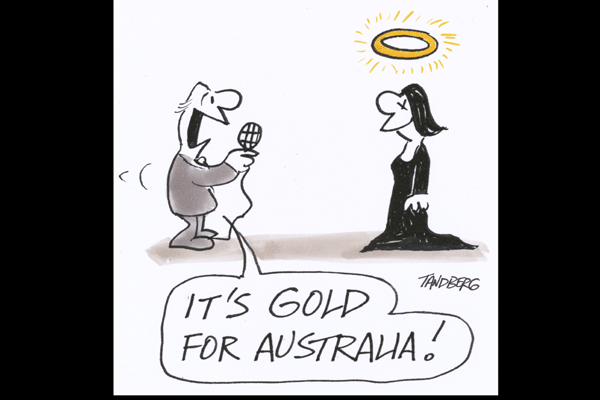Search
Recent comments
- not losing....
2 hours 30 min ago - herzog BS....
2 hours 52 min ago - freedom to say.....
5 hours 48 min ago - wanton barbarism....
18 hours 56 min ago - little nazi....
21 hours 1 min ago - arm-wrestling....
21 hours 27 min ago - decision.....
21 hours 30 min ago - unhinged....
1 day 9 min ago - nasty frog....
1 day 20 min ago - words....
1 day 28 min ago
Democracy Links
Member's Off-site Blogs
in the land of big red .....

When was the last time you heard a Labor leader declare him or herself ''the most progressive leader the ALP has ever had''? When was the last time you could be confident that a Labor leader would challenge powerful interests - especially economic and corporate power - and not back down? When was the last time you could be sure of what a Labor leader stood for, and be proud of him or her?
In 2003 Kevin Rudd told The Australian Financial Review he was ''an old-fashioned Christian socialist'', until he became an ''economic conservative'' during the 2007 election campaign. As deputy prime minister, Julia Gillard supported the Rudd government's morally justifiable 40 per cent tax on the mega-profits of mining companies. As Prime Minister, she wilted in the face of the miners' self-interested campaign and lowered the tax to a level that they deigned to pay.
As you can see, the lady's not for turning. She might have called it consultation; for most, it is capitulation.
A poll earlier this week by Essential Research drives home the point, finding
72 per cent of people thought Labor ''will promise to do anything to win votes'', 61 per cent thought it ''out of touch with ordinary people'', 46 per cent believed it ''too close to the big corporate and financial interests'', and only 28 per cent believed Labor was ''clear about what it stands for''.
Instead of squaring up to the corporate and money power - as genuine and successful progressives, such as Franklin Roosevelt, did - Gillard has decided her next quarry will be the unemployed over 55, with few prospects of re-employment, living on the bones of their arses.
We now have a ''Labor'' leader whose sole vision for Australia is of ''hard work'' and ''setting the alarm clock early''. When the US civil rights leader Jesse Jackson spoke in his 1984 and 1988 presidential campaigns for the people ''who catch the early bus'' - janitors, hotel porters, ''people who raise other people's children'' - he was protesting against the economic inequality in Ronald Reagan's America that made such servitude necessary. Unlike Gillard, he was not celebrating work as an end in itself.
The great irony is that the political class that Gillard leads and exemplifies - the ex-political staffers and union bureaucrats who have never been on tools - is the most pampered group in Australian politics. Their sense of entitlement to seats in parliament, and the undemocratic political machines that ensure they succeed, means Labor will never get its version of a Margaret Thatcher: persistent, principled and, ultimately, rewarded by the voters with big victories.
It's not just that the gene pool of potential Labor candidates has narrowed, it's that Labor does not attract people of strong character. Because their political careers have been so seamless, so absent of struggle, they cannot deal with setbacks.
The most telling sign is their fixation with polls. Ever since the 1980s, Australian Labor leaders, British Labour leaders and US Democratic presidents have been obsessed with winning the approbation of people who have never voted for them and never will.
- By John Richardson at 30 Apr 2011 - 12:32pm
- John Richardson's blog
- Login or register to post comments
a zero sum game .....
Lindsay Tanner attributes the coup against Kevin Rudd last year to the culture of modern-day politics in which MPs are spooked by an increasingly rapacious media cycle.
In a controversial new book titled Sideshow, the former finance minister says that had Mr Rudd experienced his fall from grace in the polls a decade earlier he would have been given time to recover instead of being rolled by his colleagues.
''Paul Keating's path from 1993 to 1996 bore some resemblance to Rudd's, but he wasn't removed by the Labor caucus,'' Mr Tanner writes.
''The dominance of media imagery and the machine politics it encourages is the difference. When a political leader is in trouble nowadays, patience isn't an option.''
Mr Tanner says Mr Rudd went from a strong position to ''suffering political decapitation'' within a few months.
''Even though the election wasn't due for five months, fears of irresistible media pressure led many MPs to conclude that his position couldn't be recovered.''
Mr Tanner opposed the ousting of Mr Rudd. He had already decided to leave politics at the 2010 election and he announced his resignation on June 24, the day Julia Gillard replaced Mr Rudd.
Rudd was beheaded, and it was all for nothing, Tanner laments